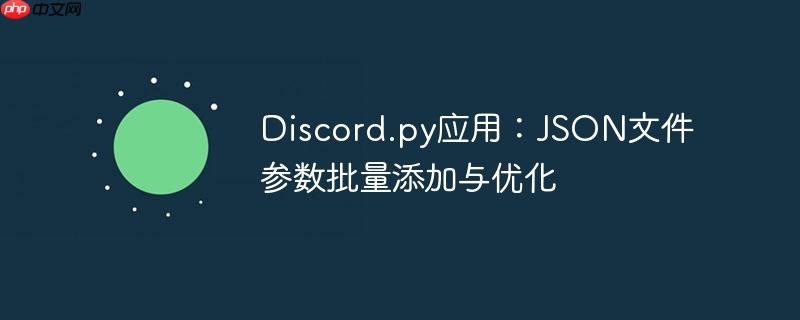
引言:Discord机器人中数据持久化的挑战
在开发discord机器人时,经常需要存储和管理用户数据,例如经济系统中的用户余额、库存物品、商店配置等。json文件因其轻量级、易读性强的特点,常被用作这类数据的持久化存储方案。然而,当需要对大量用户数据进行批量更新(如在商店更新时为所有用户库存添加新商品参数)时,如果不采用高效的方法,可能会导致性能瓶颈、数据不一致甚至程序崩溃。
问题剖析:低效的数据更新方法
一个常见的错误模式是尝试在每次迭代中都打开、修改并保存文件。例如,以下代码片段展示了这种潜在的问题:
import json
from discord.ext import commands
# 假设这是在一个Cog内部,并且user变量在实际环境中应该通过循环或参数传入
# 但此示例旨在说明原问题中代码的逻辑缺陷和潜在的效率问题
class ExampleCog(commands.Cog):
def __init__(self, bot):
self.bot = bot
self.inventory_file = "cogs/inventory.json"
@commands.hybrid_command(name = "update_shop", description = "An administrative command used to update everyone's inventories when the shop is updated!")
@commands.has_role("*") # 假设你已经配置了角色检查
async def update_shop_problematic(self, ctx: commands.Context) -> None:
try:
with open(self.inventory_file, "r", encoding="utf-8") as f:
inventory = json.load(f)
# 原始问题中的代码逻辑,存在多重问题:
# 1. 'user' 变量未定义,会导致NameError。
# 2. 即使 'user' 定义了,此代码也只针对一个用户操作,无法实现“更新所有人”的目的。
# 3. 最重要的是,如果在循环中(即便这里没有显式循环)反复执行文件写入操作,效率会非常低下。
# 每次写入都会重新打开文件,清空内容,然后写入整个JSON结构,这是昂贵的I/O操作。
if "some_user_id" in inventory: # 假设这里有一个固定的用户ID进行演示
inventory["some_user_id"]["law_tuition"] = 0
with open(self.inventory_file, "w", encoding="utf-8") as f:
json.dump(inventory, f, indent=4, ensure_ascii=False)
await ctx.send("Done!")
else:
await ctx.send("指定用户ID未找到或未执行更新。")
except FileNotFoundError:
await ctx.send(f"错误:库存文件 '{self.inventory_file}' 未找到。")
except json.JSONDecodeError:
await ctx.send(f"错误:库存文件 '{self.inventory_file}' 格式不正确。")
except Exception as e:
await ctx.send(f"更新库存时发生未知错误: {e}")
print(f"Error updating inventory (problematic): {e}")
上述代码片段中存在几个关键问题:
- 变量未定义: user 变量未在代码中定义,直接使用会导致 NameError。
- 缺乏迭代: 代码结构没有实现对所有用户的遍历,无法达到“更新所有人的库存”的目的。
- 低效的文件I/O: 即使修正了前两个问题,如果在每次更新单个用户数据后都立即打开文件并写入整个JSON,这将导致极高的文件I/O开销。每次写入操作都会涉及文件打开、清空、写入和关闭,对于包含大量用户的数据文件,这种重复操作会严重拖慢程序执行速度,并增加数据损坏的风险。
优化方案:一次加载,内存操作,一次写入
为了高效且安全地更新JSON文件,应遵循“一次加载、内存操作、一次写入”的核心原则。这意味着:
- 一次性加载所有数据: 将整个JSON文件内容读取到内存中的一个Python字典对象。
- 在内存中完成所有修改: 对内存中的字典对象进行所有必要的增、删、改操作。
- 一次性将更新后的数据写回文件: 将修改完成的字典对象一次性序列化并写入到JSON文件中。
以下是采用此优化策略的示例代码:
import json
from discord.ext import commands
import os # 用于检查文件是否存在
class Economy(commands.Cog):
def __init__(self, bot):
self.bot = bot
# 定义JSON文件路径,建议使用os.path.join确保跨平台兼容性
self.inventory_file = os.path.join("cogs", "inventory.json")
@commands.hybrid_command(name="update_shop", description="An administrative command used to update everyone's inventories when the shop is updated!")
@commands.has_role("*") # 确保只有特定角色可以执行此管理命令
async def update_shop(self, ctx: commands.Context) -> None:
# 确保文件存在,如果不存在则创建一个空JSON对象
if not os.path.exists(self.inventory_file):
await ctx.send(f"库存文件 '{self.inventory_file}' 未找到,正在创建新文件...")
with open(self.inventory_file, "w", encoding="utf-8") as f:
json.dump({}, f, indent=4, ensure_ascii=False) # 创建一个空的JSON对象
inventory = {} # 初始化为空字典
else:
try:
# 1. 一次性加载所有数据到内存
with open(self.inventory_file, "r", encoding="utf-8") as f:
inventory = json.load(f)
except json.JSONDecodeError:
await ctx.send(f"错误:库存文件 '{self.inventory_file}' 格式不正确。请检查JSON文件内容。")
return
except Exception as e:
await ctx.send(f"读取库存文件时发生未知错误: {e}")
print(f"Error reading inventory file: {e}")
return
# 2. 在内存中更新所有用户数据
# 遍历所有用户ID及其数据
# 示例JSON结构: {"[USER ID]": {"small_apartment": 0, "news_station": 0, ...}}
for user_id_str, user_data in inventory.items():
# 确保 user_data 是字典类型,以防止数据结构异常导致错误
if isinstance(user_data, dict):
# 添加或更新 'law_tuition' 参数,并将其值设为0
user_data["law_tuition"] = 0
else:
# 如果user_data不是预期的字典格式,可以记录日志或跳过
print(f"警告: 用户 '{user_id_str}' 的数据格式异常,跳过更新。数据: {user_data}")
# 可以在这里选择初始化其为字典,或跳过
# inventory[user_id_str] = {"law_tuition": 0} # 如果要强制初始化
try:
# 3. 一次性将更新后的数据写回文件
with open(self.inventory_file, "w", encoding="utf-8") as f:
# 使用 indent 参数使JSON文件更具可读性
# ensure_ascii=False 允许直接写入非ASCII字符(如中文),而不是转义
json.dump(inventory, f, indent=4, ensure_ascii=False)
await ctx.send("所有用户库存已成功更新!")
except Exception as e:
await ctx.send(f"写入更新后的库存文件时发生错误: {e}")
print(f"Error writing updated inventory file: {e}")
代码解析
- 文件路径管理: self.inventory_file = os.path.join("cogs", "inventory.json") 推荐使用 os.path.join 来构建文件路径,这能确保代码在不同操作系统上的兼容性。
- 文件存在性检查与初始化: 在读取文件之前,先检查文件是否存在。如果不存在,可以创建一个空的JSON文件(包含一个空字典 {}),以避免 FileNotFoundError。
-
错误处理 (try...except):
- json.JSONDecodeError 用于捕获JSON文件内容格式不正确的情况。
- FileNotFoundError 处理文件不存在的情况(尽管我们已提前检查并创建)。
- 通用的 Exception 捕获其他未知错误,提高程序的健壮性。
- 一次性加载数据: with open(self.inventory_file, "r", encoding="utf-8") as f: inventory = json.load(f) 这行代码将整个JSON文件的内容读取到一个名为 inventory 的Python字典中。encoding="utf-8" 确保正确处理各种字符编码。
-
内存中遍历与更新:
- for user_id_str, user_data in inventory.items(): 遍历 inventory 字典中的每一个用户ID及其对应的数据。
- if isinstance(user_data, dict): 这是一个重要的健壮性检查,确保 user_data 是一个字典,可以安全地添加新键值对。如果数据结构不一致,可以进行相应的错误处理或日志记录。
- user_data["law_tuition"] = 0 在内存中的 user_data 字典中添加或更新 law_tuition 参数。所有这些修改都发生在内存中,没有涉及文件I/O。
-
一次性写入数据: with open(self.inventory_file, "w", encoding="utf-8") as f: json.dump(inventory, f, indent=4, ensure_ascii=False) 在所有内存修改完成后,将完整的 inventory 字典一次性写回文件。
- indent=4 参数使得输出的JSON文件格式化,带有4个空格的缩进,提高了文件的可读性。
- ensure_ascii=False 参数确保如果JSON数据中包含非ASCII字符(如中文),它们将直接写入文件而不是被转义成 \uXXXX 形式,进一步提高可读性。
- 用户反馈: await ctx.send(...) 向Discord频道发送消息,告知用户操作结果。
注意事项与最佳实践
- 文件路径管理: 始终使用 os.path.join 来构建文件路径,避免硬编码斜杠或反斜杠,以确保代码在不同操作系统(Windows, Linux, macOS)上的兼容性。
- 错误处理: 对于文件I/O操作和JSON解析,务必使用 try-except 块来捕获可能发生的 FileNotFoundError、json.JSONDecodeError 以及其他 Exception,以提高程序的健壮性和用户体验。
- 数据结构一致性: 在遍历和修改数据时,最好进行类型检查(如 isinstance(user_data, dict)),以确保数据结构符合预期,避免因意外数据格式导致程序崩溃。
- JSON可读性: 在 json.dump() 时使用 indent 参数(如 indent=4)可以使输出的JSON文件更易于人工阅读和调试。同时,ensure_ascii=False 在处理非英文字符时非常有用。
- 并发访问: 如果你的机器人是多进程或多线程的,或者有多个实例可能同时尝试修改同一个JSON文件,那么直接的文件读写可能会导致竞态条件和数据损坏。对于这类复杂场景,建议考虑使用更健壮的持久化方案,如SQLite(通过 sqlite3 模块)或其他数据库系统。
- **






























